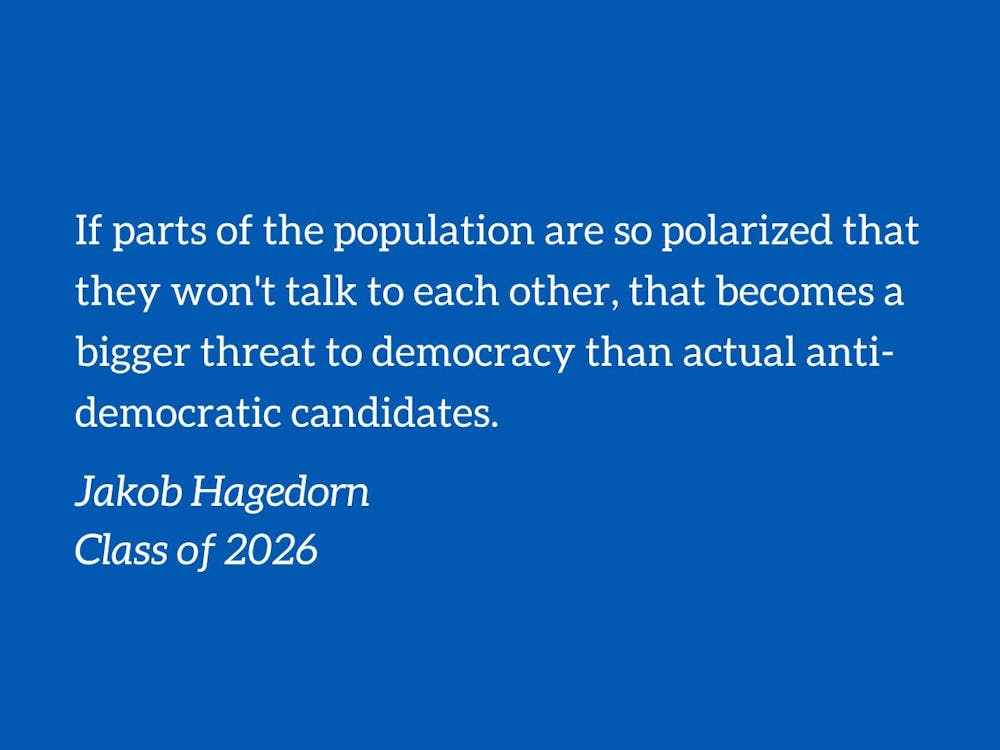My grandmother first visited the U.S. as a young German girl in 1964 as a Girl Scout camp leader, and she still tells me about it every time I mention that I'm a visiting international student at Duke. It was one of the greatest adventures of her life, and the U.S. symbolized everything she aspired to be and to have. They had defeated the Nazis and liberated Germany, and just four years after the end of the war, they were supplying the capital (and my hometown) with the Berlin Airlift during the Berlin Blockade.
As I prepared for my time at Duke, I realized how much that perception of the U.S. — and my expectations — had changed since my grandmother’s visit. Instead of the strong optimism she experienced, I felt somewhere between very excited and genuinely anxious. The America I was about to encounter seemed more divided, more uncertain. The Trump administration and its many changes and cancellations of multilateral treaties weakened trust in the U.S. as a reliable partner, and ultimately the January 6th attacks showed the world how very vulnerable one of the world's oldest democracies is. So when I came here, one of my goals was to understand what had changed and what was so different about the U.S. political system compared to the change in Germany.
I was surprised at how deeply the two-party system affects political discourse in a more polarized America. Aside from being the obvious point of criticism with its many obvious flaws, many have pointed out before, such as the possibility of winning the popular vote but not the election (most recently in 2000 and 2016), I would argue that it impacts everyday discussions.
Coming to Duke, I was struck by how often American voters seemed uninterested in discussing the election, even though it was less than two months away. I learned that if you are not politically active, it is simply not that important to discuss specific political issues because most voters always vote for one party and the direct impact is relatively small. Political disillusionment, i.e., the lack of trust in political institutions, goes far beyond voter turnout.
It was a strong contrast to the often relaxed and daily political discussions I had in Berlin (to be fair, it is a highly educated and liberal city). You can talk about relationships, homework and the global climate crisis all at once. I would argue that because Germany has about seven major political parties, the discourse can be more policy-focused. The parties have to convince voters to vote for them, instead of just convincing them not to vote for the other party. Although Germany has very similar problems with populism and government inefficiency, the discourse is different.
When we talk about discourse, we have to talk about polarization. In addition to the lack of interest I mentioned, I met people who were simply afraid of the reaction to their political opinions. If parts of the population are so polarized that they won't talk to each other, that becomes a bigger threat to democracy than actual anti-democratic candidates. Interestingly, perceived polarization, how people think about each other, is often higher than actual polarization, their actual actions and beliefs. This gives me personal hope that this process is easier to reverse than many think. It is easier to change people's opinions of others than it is to change their core beliefs and habits.
Another observation I have made is that many people's main interest is in local politics, then state government, then perhaps federal government, and finally some global news. This leads in part to a lack of knowledge about basic global issues. While there is a general blind spot in the Western hemisphere on issues affecting the global South, this solely local-to-federal focus contrasts sharply with the close attention many Europeans pay to U.S. news and the political landscape.
On issues like Russia's war against Ukraine, there is a geographic and geopolitical component to this difference. U.S. officials and part of the electorate see China as a greater threat to their national security than Russia, partly because U.S.-centric education and media tend to focus more on issues directly affecting American economic and security interests. This could also be seen in the most recent presidential debate. According to recent studies, Americans show great interest in these issues, and there is no better place than Duke to learn about them.
To be clear, I don't want to generalize the American people as uninterested or uneducated; at Duke in particular, I've met inspiring activists and people with a very impressive knowledge of world politics. As my time here continues, I find myself in a great position to learn not only about the U.S. but also about how its political dynamics resonate across the globe. I hope to offer some valuable insights and to end with a thoughtful quote from the German philosopher Novalis, allowing others to “see the ordinary as extraordinary, the familiar as strange.”
Jakob Hagedorn is a visiting international student from Berlin, Germany.
Get The Chronicle straight to your inbox
Signup for our weekly newsletter. Cancel at any time.

